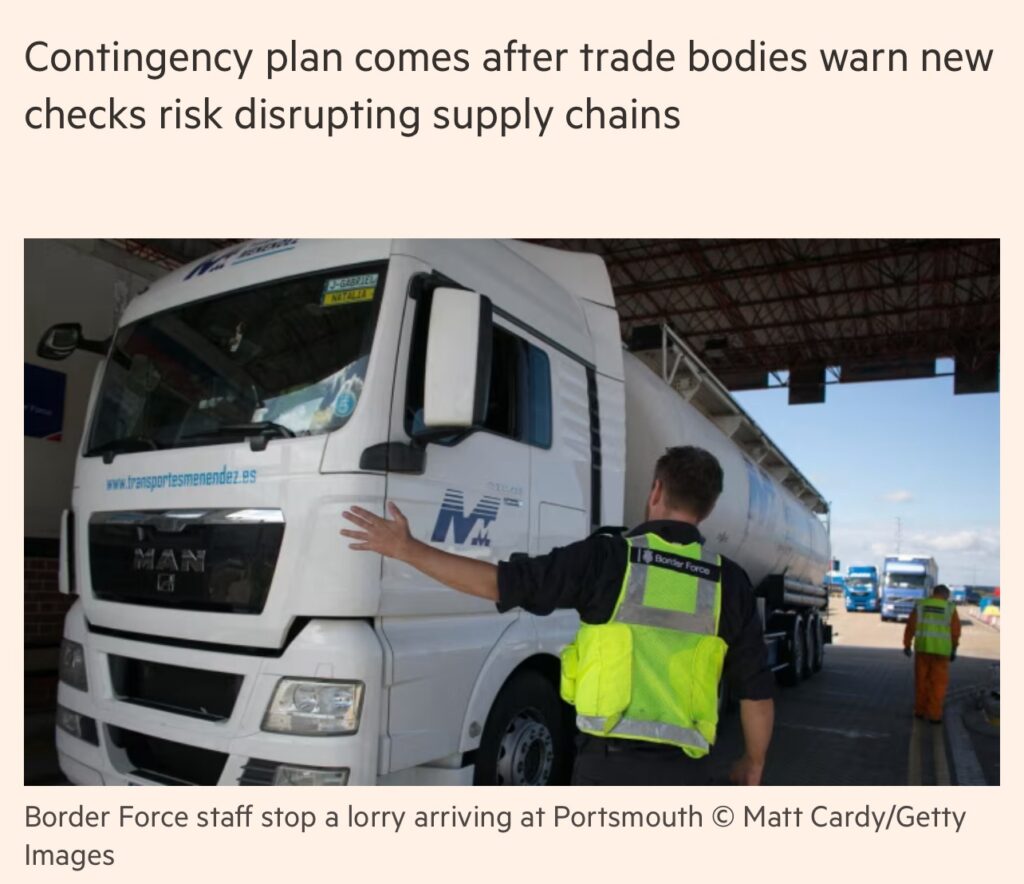UK admits ports could be overwhelmed under post-Brexit rules
Animal products entering the UK from the EU will be waved through without checks if British ports are overwhelmed by new post-Brexit border controls, according to documents seen by the Financial Times. An “automated clearance process” will clear goods for entry without paperwork checks if there are capacity issues at border control posts, the government contingency planning papers said.

Trade bodies have warned that paperwork and physical checks on plant and animal products from Europe, introduced last week but set to come into force in April, risk disrupting supply chains and causing supermarket shortages. “For a period after April 2024 there is . . . a possibility that some [border control posts] — despite good planning — may not be able to complete 100 per cent documentary checks before a consignment’s arrival in GB,” the documents said.
The automated clearance process — known as the “timed out decision contingency feature” or Todcof — will apply to medium-risk animal products “on an interim basis”, while the government rolls out the new import controls. Implementing the controls has been postponed five times since 2021, which has left EU exporters of animal and plant goods free to send their products to the UK without checks, as they had done before Brexit. The previously unreported documents were shared with port health authorities in November and were posted on the website of Portsmouth city council. Under the new post-Brexit border rules, EU businesses need to submit export health certificates to UK port and customs authorities 24 hours before goods arrive, so officials have time to check the documentation. If the goods arrived before their documentation had been verified, they would be automatically routed for physical inspection.
The government had intended this to occur for only 1 per cent of consignments. But the contingency planning document warned that the system could be overwhelmed because border control posts by April might not be ready to complete the required checks in time. In that event, the Todcof system would kick in to avoid routing goods for physical inspection and to indicate that “a documentary check had not been undertaken but the consignment was cleared for entry”. Industry experts said the mechanism reflected the challenge of imposing border checks on plant and animal products that were designed for long-haul exports, not the high-intensity traffic of cross-Channel trade that developed during the UK membership’s of the EU single market. Peter Hardwick, trade policy adviser for the British Meat Processors Association, said the mechanism was “clearly a sticking plaster”. “What it tells you is that the government is concerned above everything else to avoid the situation where delays at BCPs result in supply chain disruptions and shortages of food on the shelves,” he said. Hardwick added that the mechanism indicated that the government was not confident they had the capacity to check 100 per cent of documents even within the 24-hour window, which companies have said is too long to wait for goods with a short shelf-life, such as fresh meat.
A senior UK port industry executive said the contingency plan was a recognition that applying full border checks designed for unaccompanied container freight to high-speed, “roll-on, roll-off” ferry traffic was often impractical. “It’s the continual battle to try and ‘fix’ the systems for a type of transit and location that prospered under a different [EU single market] border system,” they added.
The Freight Liaison Group, which represents a group of trade intermediaries, said the industry had not been consulted on Todcof, and did not know what it would mean for the fee that border control posts charged for carrying out checks. “If the vehicles get waved through and don’t get processed, are people still going to be charged?” it asked. “If you go to the car wash and they’re too busy and wave you away, you don’t want to still pay for the car wash.” According to the document, “the Todcof triggering does not impact the ability for a BCP/PHA [port health authority] to charge for a documentary check”.
The Dover Port Health Authority, which oversees inspections at Britain’s busiest port, said the introduction of the system “raised serious questions” for biosecurity and public health. Last month the DPHA seized tonnes of illegal meat entering the UK from Europe. The Department for Environment, Food and Rural Affairs said: “We have strict border controls in place to protect our high biosecurity standards — and are confident that existing and new infrastructure will have the capacity and capability to handle the volume of expected checks. “As any responsible government would do, we closely monitor our borders and have prepared contingency measures to ensure businesses are properly supported.”
Source: FinancialTimes
You must be logged in to post a comment.